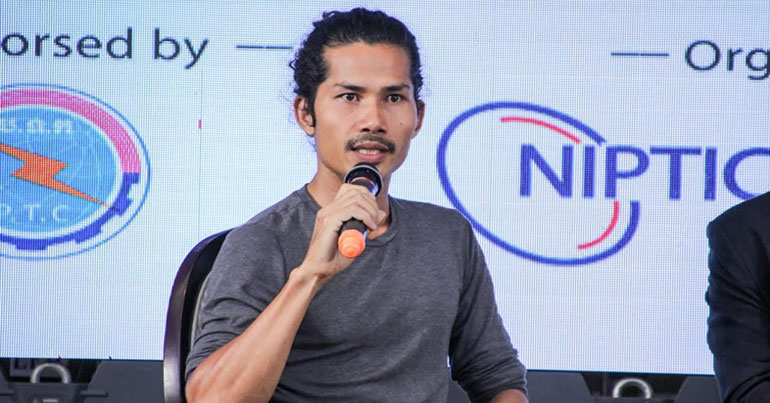You established Cambodia’s first coworking space several years ago. How has this project changed over time?
I established SmallWorld, which started out as a coworking space, in 2011. At first, it was a venture that aimed to provide office space for early-stage startups and businesses in Cambodia. We are open to all startups from around the world, to anyone who is interested in coming to Cambodia and drawing investment here. Drawing this foreign interest is important.
We also took this opportunity to help cultivate the startup scene in Cambodia and help it grow, by finding the most promising startups and fostering them. So far, we’ve invested in a few local startups including BookMeBus and Codingate. The cash we invest is normally minimal, but we invest a lot of time in helping these businesses, often giving them free offices and connecting them with potential investors. There are now a lot of coworking spaces entering Cambodia, and this is what we do to help the startup ecosystem.
Earlier this year we set up a $25,000 annual fund for startups, and we hope to use this fund to invest about $5,000 to $10,000 in a few startups a year. We will hopefully invest in one or two startups by the end of 2018.
The SmallWorld team is pursuing a few unique projects this year. Which are you most excited about?
Earlier this year, Smallworld bought 100 hectares of land outside of Phnom Penh. The purpose is to see if we can reforest about 50% of that land, and on the rest to see if we can apply effective farming techniques. This will help us to show other people and the government that we can utilise the land to find an alternative source of income for local people. Many locals around the forest chop down the wood and burn it so they can sell the charcoal, but maybe if we can show them there’s a way to make a profit from cooperative farming, we can change their perspectives and save the forest.
This year I’m also working on a project that will help young Cambodians to afford laptops, which has taken most of my attention in the past few months. I don’t want to share too many details yet, but we’re in the piloting stages now for the project and should officially launch in August of this year.
People often reject new technology. Once they can’t reject it anymore, they have to adapt
You’re highly involved in the regional tech scene. Can you describe the state of tech in the Kingdom? How does it compare to other Southeast Asian countries?
I think technology in Cambodia is quite interesting right now; we’re reaching a time when the government and private sector are joining, they’re coming together, and more startups are being fostered.
Compared to the rest of Southeast Asia, Cambodia is a very small market but it is a very good testing state. So many interests are coming from China, Taiwan and other eastern investors, and technology-based ventures are becoming the main event. In Cambodia, it’s always about the aggressiveness and the eagerness of Cambodians to start up their own companies. When it comes to education and resources, we have less than other countries, but access to funding is increasing every day.
What types of technology are you most exciting to you?
I usually am not comfortable with the existing technology solutions today. They’re good, but they could be better. Right now, the issue is that the internet is a decentralised information system, but the technology we have that uses the internet allows big companies to exploit us. So the most interesting thing for me in tech is how to decentralise all our data and the collection of our information, which can be done over time.
Outside of that, I am also very interested in how artificial intelligence (AI) is going to affect us in the future. I think AI is going to be very helpful to the business world, but you have to consider the possibility of consciousness of the machine.
The Cambodian government has repeatedly proven wary of cryptocurrencies (cryptos), the use of which currently exists in legal flux in the Kingdom. How do you feel about cryptocurrencies and their underlying blockchain technology?
In my opinion, I think cryptos are here to stay. How many of the existing coins will last, no one knows. The technology [behind cryptocurrencies] is blockchain, and the rules for this are decentralised, which I think is an important concept that can be used in any number of projects. Blockchain is the useful tech. This concept is here to stay, and how the government and big businesses respond to it doesn’t matter. Blockchain is a breakthrough, and shows that you can decentralise information, ensuring you don’t need a central authority to monitor data collection.
People often reject new technology. Once they can’t reject it anymore, they have to adapt. Personally, I think cryptos give people the flexibility to make their own destiny. This can be dangerous when a person does not have enough information, but people need to educate themselves.The issue is that cryptos are very volatile, and there are so many initial coin offerings (ICOs) out there that are scams, where people try to make money off of promoting a new cryptocurrency. But this is not a problem with the technology, but a problem with the greediness of people.
You’ve recently begun writing an autobiography with the help of your sister, Thavry Thon, who authored her own autobiography A Proper Woman. How’s it coming along?
I feel very shy about this and I keep delaying the writing. It’s not easy to write your own book and describe your experience, and so far we’ve finished only one chapter. That said, I know it is important for Cambodians to share their stories so other people can see where they’re coming from and maybe be inspired. This is what makes me keep trying to write.


